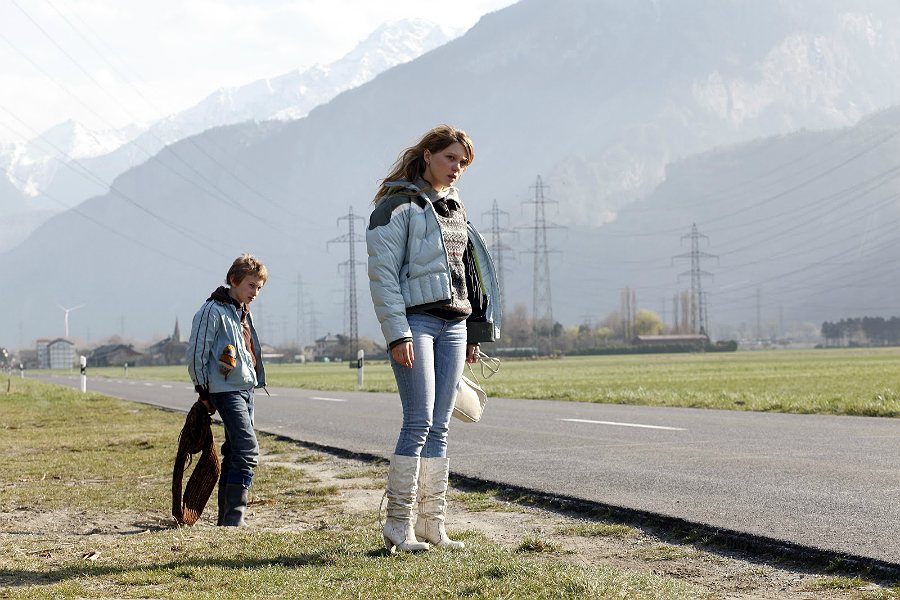Sister

DW Mault on Ursula Meier’s Sister, screening tonight as part of FACT’s Discover Tuesdays…
Scattered noise and its opposite number does strange things to a consciousness. The noise is in fact the noise of silence and loneliness, which comes across your belief system like what going to war must sound like, or Mogwai’s Like Herod. This is the world Sister drives through, holding a mirror towards the emotional violence that lies inwards, and externalises towards family and how we love/hate them and the impact of this destruction on children acting as adults, and adults acting as children.
Sister is the second film by Swiss/French director Ursula Meier and follows her debut film Home, a strange hybrid of French pastoral cinema and the dead eyed stare of Michael Haneke. With Sister she has changed tack and has given us not want we want or expect, but what we need, she inverses the screenplay teachers adage of needs and wants and we have to sit there and take it like the medicine it so obviously isn’t.
Tim Roth once said of working with Alan Clarke that he was made for the steadicam and the steadicam was made for him, for he took a character and followed them, and that was the film. Well Meier follows that dictum to the letter to create a heartbreaking cry that will be understood for all who have lived and escaped from the hot house hell of the chains of family and all that entails.
Our hero for it is he, ourselves in miniature, is Simon; a 12 year old boy forced into action by the inaction of his adult sister Louise. They are an odd couple: he the provider, she the brattishly irresponsible mess. Constantly running, from minimum wage jobs to kill the pain of nothing, by drinking to excess and then finally running off with men she’ll soon be running away from. So Simon’s life revolves around the one constant in his life, the mountain that towers over their pathetic lives. This mountain though is the cash cow that Simon milks to provide for himself and his sister.
Sister is a film of juxtaposition: of Simon and Louise’s grotty apartment at the base of the mountain where even snow is at short supply, and the grotto of riches at the top of the mountain. For Simon is introduced to us in a near 10-15 minutes sequence that is completely without dialogue, only needs and wants; which for Simon are one and the same. He steals to order, skis, gloves, equipment, you name it he can get it. He even steals the lunchboxes of small children, which he devours in the toilets.
His future changes when he is caught by a Scottish kitchen hand played by Martin Compston and they go into business together, for they are the same (another double); and the mother (played by Gillian Anderson) he latches on to while at the top of the mountain, who he gazes at and her children and imagines alternative realities where he doesn’t live to steal and steal to live.
But this is all unimportant because at the heart of all plot explanation is a banality that tonally is misjudged as an importance when it’s all just grist to the mill.
Sister looks, looks away and peers into the cracks that open within those marginalised families that exist alongside obscene displays of wealth and privilege, and how the effects of poverty effect will and effect cause; this of course is done very much through the prism of character.
The performances anchor Sister, and Kacey Mottet Klein as Simon and Léa Seydoux as Louise are tremendous, but it’s Klein who’s scorched onto your retina, never to be forgotten, he is the centerpiece, the hook that we force our imagined hopes on to, but of course there are no answers here, no beautiful happy endings, only your bourgeois face forced to acknowledge that these people exist, in all their messy reality. They make mistakes and harbour choices that’ll only hurt, but in the moment what does this matter, compared to the closeted lies of the richly stupid and their false economic ideals that mean nothing means anything.
Choices mean many things to different people. Simon’s choice is to escape, Louise is to fall through self destruction to an almost childlike naivete; but it is their choice, their free will. The moments of silence are what we remember, those silences that hark to themselves as butterflies to earthquakes, to ends that welcome those noisy silences. The looming mountain is to Simon an edenic dream of what can and will come; to Louise it’s the elephant in the room that she’d rather turn her back on, but through these separate choices, this duo will be forced on a violent collision of separation.
The separation that we make when the umbilical cord is cut, we’re free but bonded at the same time, a paradox that means we search for that point to say yes, I will, of course leave that false construct of bonded servitude that is the lie of familial bliss. Simon knows this, and that makes him special, Louise too knows it but hides from it. They in their own way are heroic in ways that seem humdrum, but of course they’re nothing but. If talent hits a target no one else can hit, but genius hits a target no one else can see, well Simon is very much the genius of his own existential scream that leaves his ‘family’ to die the horrible death that they must for him to escape. Just ask Pip, or Tolstoy, or me…
DW Mault
Sister plays as part of Discover Tuesdays 6.10pm at FACT





